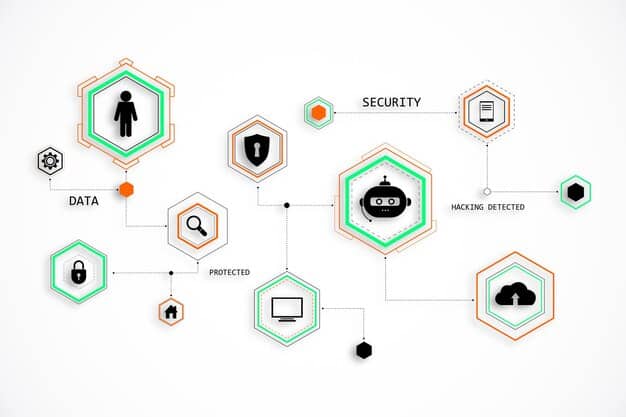US data privacy laws: are startups ready for changes?

The evolving landscape of US data privacy laws, including new state-level regulations and federal proposals, necessitates immediate attention from startups to ensure compliance and avoid significant penalties, particularly regarding consumer data rights and transparency requirements.
The regulatory environment surrounding data privacy in the US is undergoing rapid transformation, making it crucial for emerging businesses to stay ahead. Are You Ready? Key Changes to US Data Privacy Laws Impacting Startups in the Next 6 Months will explore the critical updates and future trends that could significantly influence how startups manage and protect consumer data.
The Evolving Landscape of US Data Privacy Regulations
The United States has long operated without a comprehensive federal data privacy law akin to Europe’s GDPR. This absence has led to a patchwork of state-level regulations, creating a complex compliance challenge for businesses, especially startups operating nationwide. However, the momentum towards more unified or at least more stringent privacy standards is undeniable, with several states enacting or proposing robust new laws. This dynamic environment requires constant vigilance and adaptation.
For startups, navigating these evolving regulations is not merely a legal formality; it’s a strategic imperative. Non-compliance can lead to substantial financial penalties, reputational damage, and erosion of consumer trust – all potentially fatal blows to a nascent business. Understanding the nuances of each state law, where applicable, and anticipating future federal movements is essential for building a resilient and compliant operation from the ground up. The next six months are poised to bring significant clarity and, potentially, new requirements that could reshape data handling practices across industries.
A Shifting Paradigm: From Opt-Out to Opt-In
One of the most significant shifts in data privacy philosophy in the US is the gradual move from an “opt-out” model to an “opt-in” model for certain data processing activities. While not universal, particularly for sensitive data and specific contexts, this trend redefines the baseline for consumer consent.
* Explicit Consent: Regulations are increasingly demanding clear, affirmative consent before collecting, processing, or sharing certain types of personal data.
* Granular Choices: Consumers are being given more control over which specific data points are collected and how they are used, rather than a broad “agree to all” scenario.
* Withdrawal of Consent: The right to withdraw consent at any time, with clear mechanisms for doing so, is becoming a standard feature of new privacy frameworks.
Key State-Level Laws on the Horizon
While some established laws like the CCPA/CPRA in California continue to evolve, several other states are bringing new, impactful legislation online. These laws often share common principles but differ in their specifics, thresholds, and enforcement mechanisms. Startups must determine which of these laws apply to their operations based on factors like revenue, number of consumers, and the volume of data processed.
The legislative activity at the state level underscores a growing national consensus on the importance of data privacy. Even if a federal law emerges, these state initiatives will likely inform its scope and provisions. Therefore, understanding these individual acts is crucial for immediate compliance and for anticipating the long-term trajectory of US data privacy.
Understanding the Impact: Data Governance and Consumer Rights
The core of these new data privacy laws lies in strengthening consumer rights and imposing more rigorous obligations on businesses regarding data governance. Startups, often lean and agile, might find these requirements challenging to implement without proper planning and resources. The essence of these changes is a fundamental shift in how personal data is viewed – from a corporate asset to a consumer’s right.
Data governance, in this context, refers to the overall management of the availability, usability, integrity, and security of data within an organization. For startups, this means establishing robust internal policies, procedures, and technologies to ensure compliance from the earliest stages of their data processing activities. This proactively mitigates risks and builds consumer trust.
Expanded Consumer Rights: What They Mean for Your Startup
New laws are expanding established consumer rights and introducing new ones. These rights empower individuals to have greater control over their personal information held by businesses. Startups must build mechanisms to facilitate these rights efficiently.
* Right to Know/Access: Consumers can request information about what personal data a business has collected about them, the categories of sources from which it was collected, and the specific purposes for its collection.
* Right to Correct/Rectify: Individuals have the right to request that inaccurate personal data held by a business be corrected. This requires robust data validation and update processes.
* Right to Delete: This allows consumers to request the deletion of their personal data. Startups need clear procedures for handling such requests and ensuring comprehensive data removal across all systems.
* Right to Opt-Out of Sale/Sharing: Consumers gain the right to prevent businesses from selling or sharing their personal data, particularly for targeted advertising. This often necessitates “Do Not Sell/Share My Personal Information” links on websites.
* Right to Data Portability: Enables consumers to receive their personal data in a structured, commonly used, and machine-readable format, and to transmit that data to another entity without hindrance.
Responding to these requests effectively and within specified timelines (often 30 to 45 days) requires dedicated processes and, potentially, new technological solutions. Startups unprepared for the volume or complexity of such requests could face significant operational challenges and regulatory scrutiny.
Data Minimization and Purpose Limitation
A recurring theme in modern data privacy legislation is the principle of data minimization and purpose limitation. This means businesses should only collect the data they absolutely need for a specific, stated purpose, and that data should only be used for that purpose.
This principle challenges traditional data collection models where businesses might have historically collected vast amounts of data “just in case” it became useful later. For startups, it encourages a more intentional and ethical approach to data collection, forcing them to clearly define why they need each piece of information. Implementing data minimization effectively can reduce the compliance burden and the risk of data breaches.
Compliance Strategies for Lean Startups: Navigating the Maze
For a startup with limited resources, achieving and maintaining compliance with complex data privacy laws can seem daunting. However, adopting a strategic, scalable approach can turn this challenge into an opportunity for building trust and a competitive advantage. It’s not about becoming a legal expert, but about embedding privacy principles into the operational DNA of the company.
Starting early and integrating privacy by design principles into product development and business processes is far more efficient than retrofitting compliance later. Proactive steps can save significant time, money, and potential legal headaches down the line. It’s also about fostering a culture of privacy awareness among all employees, from engineering to marketing.
Prioritizing Data Inventory and Mapping
The first critical step for any startup seeking compliance is to understand what data it collects, where it stores that data, who has access to it, and how it flows through the organization and with third parties. This process is known as data inventory and mapping.
* Identify Data Types: Catalog all personal data collected (e.g., names, emails, IP addresses, browsing history, payment information, sensitive personal information).
* Map Data Flows: Document where data originates, how it is processed, stored, shared internally, and transferred to third-party services (e.g., cloud providers, analytics tools, marketing platforms).
* Assess Legal Basis: Determine the legal basis for processing each type of data (e.g., consent, contractual necessity, legitimate interest).
* Identify Retention Periods: Establish and enforce data retention policies in line with legal requirements and business needs.
Without a clear understanding of their data landscape, startups cannot effectively manage privacy risks or respond to consumer rights requests. Moreover, transparent data mapping demonstrates accountability to regulators and builds internal clarity. Regular reviews of this inventory are essential as the startup grows and its data operations evolve.
Building a Robust Privacy Policy and User Experience
Your privacy policy is more than just a legal document; it’s a communication tool and a cornerstone of your transparency efforts. It must be clear, concise, and easily accessible. Beyond the policy, the entire user experience should reflect a commitment to privacy.

* Clear and Understandable Language: Avoid legal jargon. Ensure your privacy policy is easy for the average user to understand.
* Accessibility: Make the policy easily findable on your website or app.
* Specific Disclosures: Clearly state what data is collected, why it’s collected, how it’s used, and with whom it’s shared.
* Mechanism for Rights: Provide clear instructions on how users can exercise their data privacy rights (e.g., specific email address, web form).
* Consent Management: Implement user-friendly consent banners and preference centers that allow users to manage their data choices.
A well-crafted privacy policy coupled with an intuitive user experience that prioritizes privacy can significantly enhance customer trust and reduce potential legal liabilities. It demonstrates that the startup values its users’ privacy, fostering a positive brand image.
The Role of Third-Party Vendors and Data Sharing Agreements
In today’s interconnected business ecosystem, startups rarely operate in isolation. They often rely on a myriad of third-party vendors for everything from cloud hosting and analytics to marketing automation and payment processing. Each of these vendors, if they handle personal data, introduces an additional layer of complexity to compliance. The new data privacy laws increasingly hold businesses accountable not only for their own data practices but also for those of their partners.
This necessitates a robust vendor management strategy focused on privacy and security. Startups must conduct due diligence on all third-party service providers to ensure their data handling practices align with regulatory requirements and the startup’s own privacy standards. A weak link in the supply chain can expose the entire operation to significant risks.
Vetting Third-Party Providers for Privacy Compliance
Before engaging any third-party vendor that will process personal data, startups must undertake a thorough vetting process. This is not a one-time check but an ongoing commitment to ensure continuous compliance and risk management.
* Security Standards: Evaluate their security certifications (e.g., ISO 27001, SOC 2 Type 2) and their data breach response plans.
* Data Processing Agreements (DPAs): Ensure robust DPAs are in place. These legally binding contracts dictate how the vendor must process and protect personal data, aligning with relevant privacy laws.
* Sub-processors: Understand if and how the vendor uses its own sub-processors and ensure similar privacy and security clauses flow down to them.
* Audit Rights: Negotiate for audit rights to periodically assess the vendor’s compliance with the DPA and privacy regulations.
* Geographic Location of Data: Be aware of where the vendor stores and processes data, as this can affect which laws apply.
Failing to properly vet third-party vendors is a significant blind spot for many startups. It can lead to unintended data breaches, non-compliance fines, and reputational damage, all stemming from practices outside the startup’s direct control.
Understanding Data Sharing Agreements and Liability
Data sharing is an integral part of modern business, but under new privacy laws, it comes with increased scrutiny and liability. Startups must clearly define the terms of data sharing through formal agreements that outline responsibilities and liabilities.
The core principle here is that if a startup shares personal data, it often retains responsibility for that data, even when it’s in the hands of a third party. This joint responsibility means that breaches or non-compliance by a vendor can still impact the startup’s legal standing and reputation. Therefore, robust legal agreements are not just a formality; they are a critical risk mitigation tool.
Preparing for Data Breach Response and Incident Management
Despite best efforts, data breaches can and do occur. How a startup responds to a breach can significantly impact its legal liabilities, financial penalties, and long-term reputation. New data privacy laws impose strict obligations around data breach notification, making it imperative for startups to have a well-defined and tested incident response plan. Speed, transparency, and accuracy are paramount.
A data breach, even a minor one, can escalate rapidly if mishandled. Therefore, planning for the worst-case scenario is as crucial as preventing it. This involves not only technical safeguards but also legal, communication, and public relations strategies. Startups that demonstrate preparedness and transparency in the face of a breach are often viewed more favorably by regulators and consumers.
Establishing a Data Breach Response Plan
A comprehensive data breach response plan outlines the steps a startup will take from the moment a potential breach is detected to its resolution and post-incident review. This plan should be well-documented, communicated to key personnel, and regularly updated.
* Detection and Containment: Procedures for identifying a breach, isolating affected systems, and preventing further unauthorized access.
* Assessment and Analysis: Steps to determine the scope of the breach, the type of data compromised, and the number of affected individuals.
* Notification Requirements: Clear guidelines on who needs to be notified (regulators, affected individuals, law enforcement) and within what timeframe, based on applicable laws.
* Remediation: Actions to fix vulnerabilities, strengthen security, and recover affected data/systems.
* Post-Incident Review: A process for learning from the incident and implementing improvements to prevent future breaches.
Regular testing of the incident response plan through tabletop exercises or simulations can help identify gaps and ensure that the team is prepared to act swiftly and effectively under pressure.
Understanding Notification Timelines and Requirements
Data breach notification laws vary by state and the type of information compromised. However, a common thread across most regulations is the requirement for timely notification to affected individuals and, in many cases, to state attorneys general or other regulatory bodies.
The “timely” aspect is critical, with many laws requiring notification “without unreasonable delay” or within a specific number of days after discovery. Failing to meet these strict timelines can result in additional penalties. Startups must be aware of the specific notification thresholds and content requirements for each applicable jurisdiction, including what information must be conveyed to affected individuals and how.
The complexity of these requirements underscores the need for clear legal counsel and potentially specialized incident response firms to guide startups through the aftermath of a breach. Proactive planning helps ensure a measured, compliant, and least damaging response.
The Future of US Data Privacy: Preparing for What’s Next
The current trajectory suggests a continued evolution of US data privacy laws, characterized by increasing stringency and a potential move towards federal harmonization. While a single, overarching federal law might still be some time away, the push from states for greater privacy protections indicates a clear direction. Startups neglecting these trends do so at their peril; those that embrace them can carve out a distinct advantage.
The coming months will likely see more states enacting their own comprehensive privacy laws, each adding complexity to the compliance landscape. However, there is also growing bipartisan support for a federal data privacy framework, which, if passed, would significantly streamline compliance efforts for businesses operating nationwide. Regardless of the legislative path, the emphasis on consumer rights and data accountability will only grow stronger.
Anticipating Federal Legislation and Sector-Specific Rules
While states have been leading the charge, the debate around a federal data privacy law continues to gain momentum. Several proposals have been introduced in Congress, sharing common elements like national consumer rights, data minimization, and stricter enforcement.
A comprehensive federal law could supersede many state laws, simplifying compliance for startups operating across state lines. However, it will also likely bring its own set of challenges, potentially including higher penalties and broader scope. In addition to general privacy laws, specific sectors (e.g., health, finance) already have and may see further development of their own stringent regulations (e.g., HIPAA, GLBA), which startups in those areas must also navigate.
Staying informed about legislative developments at both federal and state levels, subscribing to industry updates, and engaging with legal counsel specializing in data privacy are crucial steps for startups to remain prepared and agile in this rapidly changing regulatory environment. Proactive engagement with these future trends can position a startup as a responsible and trustworthy entity in the eyes of consumers and regulators alike.

Investing in Privacy-Enhancing Technologies and Expertise
Compliance is not just a legal exercise; it’s increasingly a technological one. Startups should consider investing in privacy-enhancing technologies (PETs) and building in-house or outsourced privacy expertise.
* Consent Management Platforms (CMPs): Tools for managing user consent preferences and cookie banners.
* Data Mapping and Inventory Tools: Software to help automate the identification and mapping of personal data across systems.
* Secure Data Storage and Encryption: Implementing robust technical safeguards to protect data at rest and in transit.
* Privacy by Design Tools: Incorporating privacy considerations into the design and architecture of products and services from the outset.
Beyond technology, building or acquiring expertise in data privacy is invaluable. This could mean hiring a dedicated privacy officer, training existing staff, or engaging external consultants. A combination of technological solutions and human expertise will be essential for continuous compliance in the evolving privacy landscape. Ultimately, the startups that thrive will be those that view data privacy not as a burden, but as a fundamental aspect of their business strategy and a driver of consumer trust.
| Key Area | Brief Description |
|---|---|
| 📊 Data Mapping | Identify and document all personal data, its flow, and purpose within your startup. |
| 📝 Consumer Rights | Prepare to handle requests for access, correction, deletion, and opt-out of data. |
| 🤝 Vendor Agreements | Ensure all third-party data processors align with privacy regulations. |
| 🚨 Breach Response | Develop a clear plan for detecting, containing, and notifying stakeholders about data breaches. |
Frequently Asked Questions
Several states are enacting new comprehensive privacy laws, building on the model of California’s CCPA/CPRA. Key ongoing developments include laws in states like Virginia (VCDPA), Colorado (CPA), Utah (UCPA), and Connecticut (CTDPA), which bring expanded consumer rights and business obligations. Keeping track of specific effective dates and thresholds for each is vital for startups.
“Personal data” broadly covers any information that identifies, relates to, describes, is reasonably capable of being associated with, or could reasonably be linked, directly or indirectly, with a particular consumer or household. This can include names, email addresses, IP addresses, browsing history, and even inferred characteristics. Startups must assess all data collected through this broad lens.
“Privacy by design” means integrating privacy protections into the design and operation of products, services, and business practices from the earliest stages, rather than adding them as an afterthought. For startups, this approach is crucial because it ensures compliance is built-in, reduces the risk of non-compliance, and fosters customer trust from the ground up, making retrofits unnecessary and costly.
Yes, under many new data privacy laws, startups can be held accountable for the data handling practices of their third-party vendors. If a vendor experiences a breach that compromises personal data shared by the startup, the startup may still face penalties, reputational damage, and customer lawsuits. Robust data processing agreements are essential to mitigate this exposure.
Penalties vary widely by state and the severity of the violation, but they can be substantial. Fines can range from thousands to tens of thousands of dollars per violation or per affected consumer. Some laws also allow for private rights of action, enabling individuals to sue for damages. Beyond financial penalties, non-compliance can lead to severe reputational harm for a nascent startup.
Conclusion
The rapid evolution of US data privacy laws presents a significant, yet manageable, challenge for startups over the next six months and beyond. Far from being a mere regulatory hurdle, embracing these changes offers an opportunity to build trust, enhance brand reputation, and future-proof operations. By adopting a proactive stance, investing in robust data governance, understanding consumer rights, carefully managing third-party relationships, and preparing for incident response, startups can not only navigate the complex legal landscape but also thrive within it. The future belongs to businesses that prioritize privacy as a core value.





